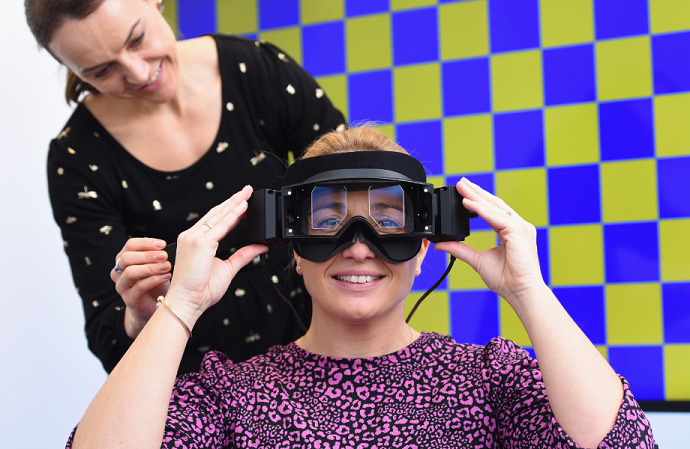If you have ever had vertigo, you are probably familiar with the awful feeling of unsteadiness and dizziness. It feels as if the world around you is spinning, or you are spinning. It can make you feel nauseous or woozy. Most of us know that running around in circles can cause dizziness; but what if there is, seemingly, no cause?
The sensations of vertigo and dizziness are your body’s way of telling you that something isn’t right. They are signs that something needs to be investigated, but many people simply choose to live with their vertigo, feeling that nothing could possibly be done about it.
Trevor Chapman, Lead Audiologist at angli-EAR Hearing in Great Shelford wants to raise awareness of Vestibular Disorders and assure that help is at hand for sufferers: “There are many causes of dizziness and vertigo. Often it can be due to low blood sugar levels, stress, medication, heart issues, ear infections or dehydration. It can sometimes, though, be due to issues with the vestibular system of the inner ear.”
The vestibular system are the parts of the inner ear and brain responsible for good balance, controlling eye movements and coordination. Everyday tasks such as getting out of a chair, carrying shopping bags whilst walking, or standing on tip-toes to reach an object, all require good balance.
However, sometimes the vestibular system can struggle if it is damaged by illness, injury or the effects of ageing and you may experience disorientating symptoms of imbalance that can impact your everyday life. These can affect your ability to perform daily activities, chores, work, and exercise. That may include vertigo, dizziness, headaches and falls or unsteadiness.
Trevor explains: “Astonishingly, 35% of adults aged 40 and older experience symptoms of vestibular disorder at some point in their lives. Many do not seek a diagnosis and just “put up with it” which can have a huge impact on their day-to-day life. We’ve had clients report to us that their symptoms have meant they have felt forced to give up work or hobbies.
“Without a diagnosis, then the appropriate treatment plan cannot be put into place. It’s important to get your dizziness assessed for its underlying cause as vestibular disorders, such as BPPV (Benign Paroxysmal Positional Vertigo), Vestibular Migraine and Meniere’s Disease, can be managed. Of course, if you experience dizziness alongside other symptoms, like slurred speech, numbness in the limbs or face, or loss of consciousness then seek medical help immediately.”
angli-EAR Hearing’s team of expert audiologists includes specialists trained in the assessment and rehabilitation of vestibular disorders. The clinic has recently invested in state-of-the-art diagnostic equipment to help those experiencing debilitating dizziness symptoms. This helps sufferers manage their symptoms which can improve their everyday life and also reduce the risk of falls through unsteadiness.
“Clients often tell us that their dizziness has previously just been diagnosed as “vertigo” and they’ve been given vestibular suppressants such as antihistamines or anti-sickness medication to try to reduce the feelings of dizziness. But vertigo is a symptom, not a diagnosis, and there will be a root cause to find and treat”, explains Trevor.
“An accurate diagnosis for vestibular disorders is essential. This is best achieved through understanding a person’s medical history, performing a Full Diagnostic Hearing Assessment to accurately assess the abilities of all the components of the hearing pathway, body movement tests and, using innovative non-invasive vestibular testing technology including Video Head Impulse Test (v HIT) and Videonystagmography (VNG) to test eye and head movements, and coordination. Once the cause has been identified then treatments such as Vestibular Physiotherapy Rehabilitation or referral for medication or surgery can be considered.”
angli-EAR Hearing has this year appointed a highly experienced Vestibular Physiotherapist, Viktoria Azoidou, to the Vestibular Audiology team as demand for balance and vestibular services has increased, with clients travelling from all over the region for Vestibular diagnostic and rehabilitation services.
“Viktoria’s experience adds to the strengths of the Audiology team to help clients successfully manage their dizziness and vertigo symptoms through a tailored programme of specific vestibular physiotherapy exercises which help, with an accompanying prescription of exercises to do at home, to re-train the Vestibular system which can make such a huge difference to a person’s lifestyle.” says Trevor.
“If left undiagnosed and untreated, balance and vestibular symptoms can result in worsening unsteadiness, and an increased risk of falls and injury. It may also create anxiety over worsening symptoms, worrying about potentially falling resulting in loss of confidence, inactivity, and a loss of independence.
Seeking an assessment to determine the cause of your symptoms and a treatment/rehabilitation plan can improve your balance and restore your quality of life.”
To find out more about angli-EAR Hearing’s Balance and Vestibular service visit our Balance and Vestibular pages or call 01223 661 399.



